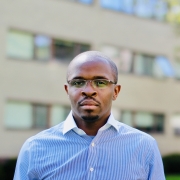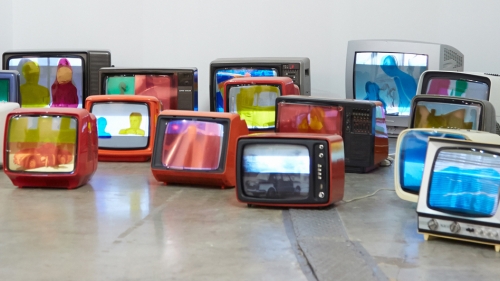A new book by Media, Culture, and Communication Assistant Professor j. Siguru Wahutu speaks with, and looks at the reportage of, African journalists depicting their own continent. With In the Shadow of the Global North: Journalism in Postcolonial Africa (Cambridge University Press, August 2024), Wahutu shows that African journalists are themselves implicated in the marginalization of African voices. Unpacking the reasons for this self-silencing, he examines what it means to be an African news organization, and what it means to be an African journalist, in light of a politics of identity and belonging in the postcolonial era.
We posed some questions to Wahutu as his book went to print.

This book is about giving African journalists a platform to discuss how they construct knowledge about Africa.
Scholars have brought attention to the destructive narratives about the continent repeated by Western media and to the silencing of African voices in much of the Global North's news coverage. But your book argues that these same academics have perpetuated their own silencing with a failure to engage with African news outlets and African journalists directly. How do you explain the field's blind spots? How does In the Shadow alter this scholarly practice?
This is a fantastic question! The blindspots are not unique to journalism studies and are anchored in a more extensive imperialistic logic of knowledge production. Typically, intellectual work has solely been concerned with the concerns of the metropole. When this interest branched into the majority world, it usually concerned how these spaces could be understood as incomplete copies of the metropole. As such, places such as Africa are only interesting if scholars can highlight their incompleteness so that we can go in and 'teach them the metropole's ways.' In The Shadow argues that we can study Africa as a space that produces knowledge not only for Africans but also as a place where we can understand the daily rhythms of life without constantly comparing these to those in the metropole. It approaches journalism and journalists not as a flawed space but with a curiosity borne out of a realization that very little is known about how the space operates. We know a lot about how to 'improve' the profession, but there needs to be more theorization of how the profession works to construct the notion of Africa and Africans. To achieve this, In The Shadow marginalizes journalism fields from the global North.
The book is a must-read for rethinking existing discourses on the representation of Africa in the news media.
You devote a lot of time interviewing journalism students about what it means to be an African journalist. What were some of your most surprising findings from these conversations with young journalists?
One of the most surprising thing is the extent to which young journalists took for granted that journalism on the continent had to look like journalism in the metropole. Considering the decolonization conversations sweeping the continent during my fieldwork, there needed to be more conversation over what 'African journalism' could look like or even if there was such a thing as 'African journalism.'
I recently attended the African Media Festival and was part of a discussion over whether there could be a journalism unique to the continent. Yet even here, years after the original fieldwork, there seemed to be an insistence on journalism that mimicked its counterpart in the metropole. But, and this is important, many of these discussions were also tinged with a hope that journalism on the continent could reflect our lived realities. As such, young journalists appear to be unconsciously multilingual in their discussions about the profession. They want a contextually relevant profession while wishing the profession mimicked that of the metropole.
You teach a popular course whose topic is media and mass atrocities in Africa. Heavy topic notwithstanding, undergraduates often tell me that it is the best course they've taken at NYU. You were able to visit Rwanda last year as part of the itinerary. What are you hoping students take from your classes? What lightbulb moments have you witnessed in your students?
The students are being too kind in their assessment of the class. The class works well because the students are typically outstanding and are driven by an unquenchable thirst to learn about their world. I hope my students can look at their worlds and see how interconnected their struggles are to those happening halfway around the world. Once this happens, students can build an architecture of resistance and political consciousness since they can think about problems and solutions in a multidimensional manner. I remember in Rwanda, when visiting genocide memorials, some of the students found themselves thinking about death, suffering, and mortality not just as a theoretical topic but as one that was visceral and central to understanding multiple other conflicts that were unfolding at the time. On a trip to Ghana, students visited Elmina Castle and we discussed how visiting the site made the topic of slavery more visceral than reading it in a book in New York or Beijing.
For students, these moments capture both the depravity of humanity and the possibility of human futures. These visits have allowed students to not only question what Julian Go calls an 'imperial unconscious' of the knowledge they have consumed about Africa and Africans while also questioning the occlusion of imperialism in discourses of the majority world.
Related Department

Media, Culture, and Communication
239 Greene Street, 8th floor
New York, NY 10003
212-998-5191 | contact
